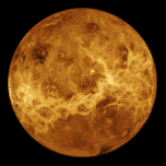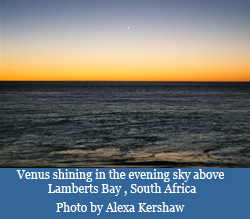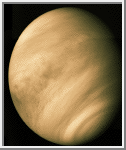
 Venus is the second closest planet to the sun. Viewed from earth it is the brightest of the planets. In fact if you know where to look it is possible to see it in broad daylight. At night it is bright enough to cast shadows. It's brightness is due to two things. Firstly it is quite close to earth compared to the other planets. Secondly it is highly reflective and a lot of sunlight bounces off the planet.
Venus is the second closest planet to the sun. Viewed from earth it is the brightest of the planets. In fact if you know where to look it is possible to see it in broad daylight. At night it is bright enough to cast shadows. It's brightness is due to two things. Firstly it is quite close to earth compared to the other planets. Secondly it is highly reflective and a lot of sunlight bounces off the planet.
Venus was once thought to be a tropical planet rich in vegetation. It was difficult to find out what the surface of Venus was like because it was always covered in cloud.
In the 1970s American and Russian probes were sent through the clouds to measure surface temperature and analyse the atmosphere. None of these probes lasted very long and the reasons soon became clear. The temperature at ground level was 840 degrees fahrenheit, the atmospheric pressure was 90 times that of earth and the atmosphere was highly corrosive. Basically if you send a probe to Venus it will either melt, be crushed or rust. Not somewhere you would want to park your car!
The extremely high temperatures on Venus seem to have been caused by the high quantities of carbon dioxide in the atmosphere which has lead to the greenhouse effect, so an understanding of our sister planet could have profound importance for the future of our own.


No comments:
Post a Comment